新目标英语八年级下Unit9知识点总结(打印版)
人教版新目标英语八年级下册:Unit 9《Have you ever been to museum》 讲解+练习题目+答案
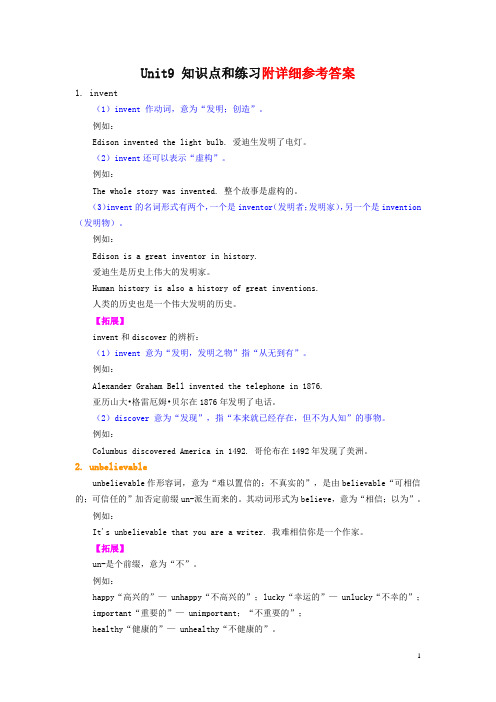
Unit9 知识点和练习附详细参考答案1. invent(1)invent 作动词,意为“发明;创造”。
例如:Edison invented the light bulb. 爱迪生发明了电灯。
(2)invent还可以表示“虚构”。
例如:The whole story was invented. 整个故事是虚构的。
(3)invent的名词形式有两个,一个是inventor(发明者;发明家),另一个是invention (发明物)。
例如:Edison is a great inventor in history.爱迪生是历史上伟大的发明家。
Human history is also a history of great inventions.人类的历史也是一个伟大发明的历史。
【拓展】invent和discover的辨析:(1)invent 意为“发明,发明之物”指“从无到有”。
例如:Alexander Graham Bell invented the telephone in 1876.亚历山大•格雷厄姆•贝尔在1876年发明了电话。
(2)discover 意为“发现”,指“本来就已经存在,但不为人知”的事物。
例如:Columbus discovered America in 1492. 哥伦布在1492年发现了美洲。
2. unbelievableunbelievable作形容词,意为“难以置信的;不真实的”,是由believable“可相信的;可信任的”加否定前缀un-派生而来的。
其动词形式为believe,意为“相信;以为”。
例如:It's unbelievable that you are a writer. 我难相信你是一个作家。
【拓展】un-是个前缀,意为“不”。
例如:happy“高兴的”— unhappy“不高兴的”;lucky“幸运的”— unlucky“不幸的”;important“重要的”— unimportant;“不重要的”;healthy“健康的”— unhealthy“不健康的”。
(人教新目标)八年级英语(下)短语语法知识点汇总Unit9
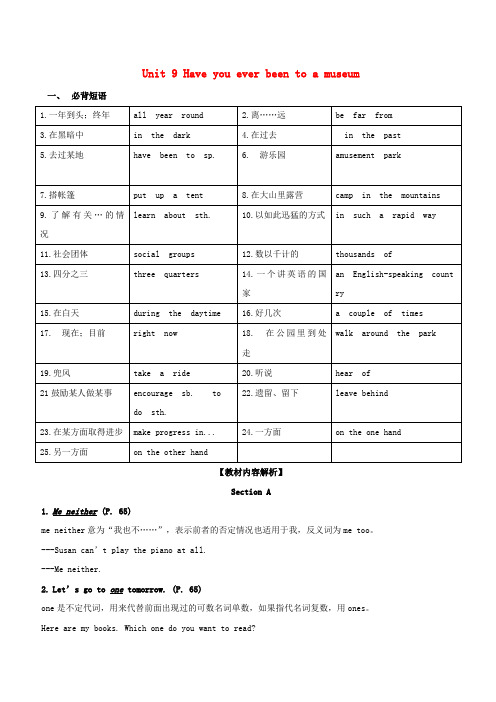
Unit 9 Have you ever been to a museum 一、必背短语【教材内容解析】Section A1.Me neither (P. 65)me neither意为“我也不……”,表示前者的否定情况也适用于我,反义词为me too。
---Susan can’t play the piano at all.---Me neither.2.Let’s go to one tomorrow. (P. 65)one是不定代词,用来代替前面出现过的可数名词单数,如果指代名词复数,用ones。
Here are my books. Which one do you want to read?---I don’t like these dresses.---How about those ones over there.3.Let’s go somewhere different today. (P. 65)somewhere用作副词,表示“在某处、到某处”,常用于肯定句中,在否定句和疑问句中用anywhere。
It’s cold here. Let’s go somewhere else.Did you go anywhere last Sunday?4.They are going to take the subway. (P. 66)take the subway意为“乘地铁”,take用作动词,可以表示“乘、坐(车、船等)”。
We take the subway to work every day.5.It’s a great way to spend a Saturday afternoon. (P. 66)(1) way表示“方法”时,后常接动词不定式或者of doing作定语。
Can you think out a way to open the door/of opening the door?(2) spend的用法① sb. spend+时间/金钱+on sth. “在某事上花费多长时间或者多少钱”The man spent the whole day on his speech.The family spent 10,000 dollars on their trip.② sb. spend+时间+(in) doing sth. “花费多长时间做某事”The boy has spent two hours playing the computer games.【拓展】辨析spend, pay, take和cost6.We put up a tent and cooked outside. (P. 66)put up意为“搭建”,还可以表示“举起、张贴”。
英语八年级下册unit9知识点

英语八年级下册unit9知识点Unit9的主题是“Do you want to go to a movie?”,主要学习的是谈论你的喜好和接受或拒绝邀请的表达方式。
以下是Unit9的知识点总结。
一、句型结构1.询问对方的喜好Do you like…?What do you think of…?2.表达喜好I like…I love…I’m crazy about…It’s my favorite.3.接受邀请Sure, I’d love to.That sounds great/good. I’d be happy/pleased to.4.拒绝邀请I’m sorry, but I can’t. I’m afraid I have to…Maybe another time.二、词汇1.电影genresaction movie 动作片comedy 喜剧drama 剧情片horror movie 恐怖片2.电影院cinema/movie theater3.邀请及回应invite and response Would you like to…? 你想要……吗?Can you…? 你能……吗?Do you want to…? 你想……吗?四、语法1.比较级和最高级形容词和副词在表示比较的时候,需要使用比较级和最高级。
从以下三个方面来比较:一般比较:as + 形容词/副词 + as比较级:形容词/副词 + er + than最高级:the + 形容词/副词最高级 + 名词2.情态动词情态动词可以用于表达建议、请求、命令、许可等意思。
can 可以could 能够may 可以might 可能should 应该shall 将will 意愿would 意愿五、表达技巧1.巧用缩略词在口语中,使用缩略词表达更为简洁。
I’d like to = I would like to = I wanna2.注意语调和语气语气是表达意图的关键所在,我们需要通过语调和语气来准确表达自己想要表达的情感。
(完整版)人教版新目标八年级下册英语Unit9知识点
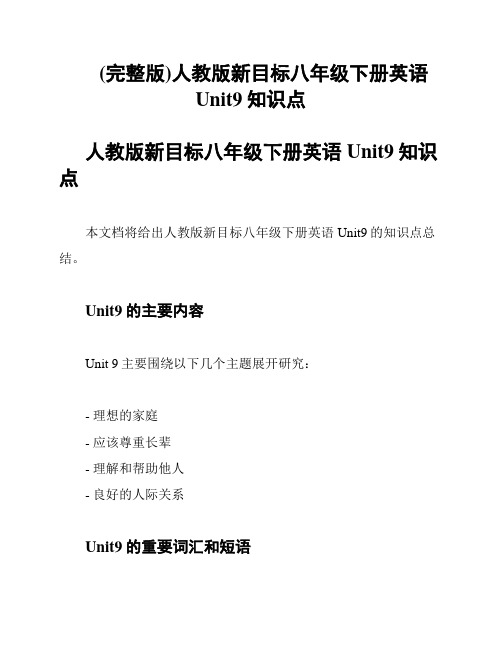
(完整版)人教版新目标八年级下册英语
Unit9知识点
人教版新目标八年级下册英语Unit9知识点
本文档将给出人教版新目标八年级下册英语Unit9的知识点总结。
Unit9的主要内容
Unit 9主要围绕以下几个主题展开研究:
- 理想的家庭
- 应该尊重长辈
- 理解和帮助他人
- 良好的人际关系
Unit9的重要词汇和短语
本单元涵盖了一些重要的词汇和短语,包括但不限于:
- behave (行为)
- respect (尊敬)
- generation gap (代沟)
- argue (争吵)
- family values (家庭价值观)
Unit9的语法重点
在这个单元中,有一些语法知识需要重点掌握:
- 情态动词 "should" 的用法
- 过去进行时的基本结构和用法
Unit9的研究重点
Unit 9的研究重点包括但不限于以下几个方面:
- 了解和表达理想的家庭
- 研究并运用适当的家庭价值观
- 学会应对代沟问题和家庭争吵
- 理解和运用情态动词 "should"
Unit9的研究资源推荐
为了更好地研究和巩固Unit 9的知识,可以尝试以下研究资源:
- 教科书中的课文和练题
- 在线研究平台上的相关练和测验
- 视频课程和教学视频
以上是人教版新目标八年级下册英语Unit9的知识点总结,希
望对你的学习有所帮助!。
新目标英语八年级下Unit9知识点总结打印版

使用建议:先听录音,再做练习,注意语 音、语调和语速的模仿与提高
新目标英语八年级下Unit9 的口语训练
第七章
口语技巧总结
保持自信:相信自己能够流利表达,克服紧张情绪 注意语音语调:准确掌握单词发音,注意语调的变化,让语言更有表现力 丰富词汇:积累常用词汇和短语,提高表达能力 掌握基本句型:熟悉基本句型和语法结构,避免常见的口语错误
口语练习题目及答案解析
● 题目:请简述在餐厅点餐的常用表达。 答案解析:在餐厅点餐时,常用的表达包括“I would like to order”(我想点餐)、“What would you like to eat?”(你想吃什么?)、“I will have the same as what he/she is having.”(我要和他/她一样的菜)等。 ● 答案解析:在餐厅点餐时,常用的表达包括“I would like to order”(我想点餐)、“What would you like to eat?”(你想吃什么?)、“I will have the same as what he/she is having.”(我要和他/她一样的菜)等。
第六章
听力技巧总结
提前阅读选项,预 测听力内容
集中注意力,抓住 关键词
边听边记笔记,记 录关键信息
掌握听力技巧,提 高听力水平
听力练习题目及答案解析
题目:听对话,选择正确的选项 题目:听短文,填空 题目:听对话,判断正误 题目:听短文,选择合适的答案
听力材料来源及使用建议
来源:教材配套听力材料
● 题目:请列举几个常用的公共场合标识语。 答案解析:在公共场合,常用的标识语包括“No smoking”(禁止吸烟)、“No littering” (禁止乱扔垃圾)、“Do not touch the exhibits”(请勿触摸展品)等。这些标识语提醒人们在公共场合遵守规定,保持环境整洁。 ● 答案解析:在公共场合,常用的标识语包括“No smoking”(禁止吸烟)、“No littering”(禁止乱扔垃圾)、“Do not touch the exhibits” (请勿触摸展品)等。这些标识语提醒人们在公共场合遵守规定,保持环境整洁。
人教新目标八年级英语下册Unit9知识点归纳及练习汇总

人教新目标八年级英语下册Unit9知识点归纳及练习汇总1. 学习本课重点单词,短语和句型。
2. 学会谈论过去的经历。
—Have you ever been to the science museum?—Yes, I have. I went to the National Science Museum last year.—Have you ever been to the space museum?—No, I haven’t.重点单词:progress, encourage, collect, safe, fear, whether, whenever短语:on the one hand… on the other hand, thousands of, three quarters句型:(1)Have you ever been to a science museum?(2)Me neither.难点现在完成时【单词学习】1. progress v. 进步;进展progress还可作名词“ 进步;进展”,常构成短语:make progress 取得进步。
Mary is progressing in her studies. 玛丽在学习上有进步。
They worked hard for a month and made big progress.他们努力学习了一个月,并取得很大进步。
根据汉语意思完成下句他的学习进步得那么快,简直难以置信。
It’s __________ that his studies _________ __________ so quick ly.答案:unbelievable; have progressed2. encourage v. 鼓励;激励常用短语为:encourage sb. to do sth. 意为“鼓励某人去做某事”。
Teachers always encourage us to be brave. 老师们经常鼓励我们要勇敢。
八年级英语下册 Unit 9 Have you ever been to a museum复习 (新版)人教新目标版

Unit 9 Have you ever been to a museum?默写1 Section A 1a~2d一、默写课文中的单词。
1. 照相机;摄影机;摄像机 ______2. amusement n. ______3. somewhere adv. ______4. invention n. ______二、默写课文中的短语。
1. 游乐场 ______2. 去过 ______3. 科学博物馆 ______4. 某个不同的地方 ______5. 太空博物馆 ______6. 玩得很开心 ______7. 了解;获知 ______ 8. 彩色电影 ______9. 电影摄像机 ______ 10. 搭建 ______三、根据汉语提示完成下列句子。
1. 你曾经去过一家科学博物馆吗?______ you ______ ______ ______ a science museum?2. 弗兰克在水上公园玩得很开心。
Frank ______ ______ ______ ______ at the water park.3. 约翰从没有去过太空博物馆。
John ______ ______ ______ ______ the space museum.4. 你曾经去过那儿吗?Have you ever ______ ______ ?5. 它是一个度过周六下午的好方式。
It’s a great way ______ ______ a Saturday afternoon.6. 我还了解一些发明,它们成就了彩色电影。
I learned about the inventions that ______ ______ color movies, too.7. 我从未野营过。
I’ve never ______ ______ .知识积累somewhere与 anywhere的用法辨析:相同点:都表示“在某处”。
不同点:somewhere多用于肯定句中;anywhere多用于疑问句和否定句中。
新目标英语八年级下Unit 9知识要点归纳总结
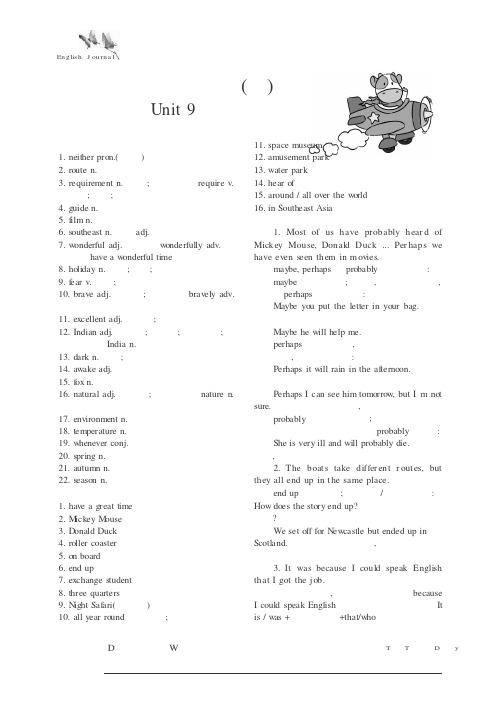
It was we who held a class meeting in the classroom yesterday.( 强调主语 we)
It was a class meeting that we held in the classroom yesterday.( 强调宾语 a class meeting)
1. Most of us h ave prob ably h ear d of
Mick ey Mou se, Don ald Duck ... Per hap s we have even seen th em in m ovies.
maybe, perhaps 与 probably 的用法区别: maybe 意 为“ 也许 ; 大 概”, 口语 中很 常见 , 但没有 perhaps 正式。例如: Maybe you put the letter in your bag. 也 许 你把信放在你的包里了。 Maybe he will help me. 也许他会帮助我。 perhaps 意 为“或许”, 表 示说话人对 当前的 事有疑问, 不肯定。例如: Perhaps it will rain in the afternoon. 也许 下 午会下雨。 Perhaps I can see him tomorrow, but I’m not sure. 或许我明天能见到他, 不过我还不能肯定。 probably 意为“很可能地; 大概地”。说话人 对某事的发生有相当把握时用 probably。例如: She is very ill and will probably die. 她病得 很重, 命可能保不住了。 2. The b oat s take d iffer en t r out es, but th ey all end up in t he same place. end up 意为“结束; 最后成为/处于”。例如: How does the story end up? 这个故事是怎么结 尾的? We set off for Newcastle but ended up in Scotland. 我们动身去纽卡斯尔, 可后来却去了 苏格兰。 3. It was because I cou ld speak English th at I got the j ob . 这是个 强调句, 强 调的是原因状 语 because I could speak English。强 调句 的结构 形式 为“It is / was + 被强调成分+that/who 从句”。被强调的
8下unit9知识点

八下Unit 9 知识点P651. 完成时的标志词:ever, never, just, yet, already, yet,so far, in the last three years,since +时间点,for+时间段. 2. 辨析:1) have been to去过某地(说话人在此)2) have gone to 去了某地(说话人不在此)3) have been in/at 在某地持续呆了多长时间。
当其后有地点副词(there, here, back, home)时,要省略介词。
3. Me neither. 我也没有。
用在前面否定句的后面,表示“…也不一样”。
Me too. 我也一样。
用在肯定句的后面,表示“…也一样”。
4. the film /space / history/ art / museum电影/太空/历史/艺术博物馆5. amusement park水上公园/游乐场6. somewhere different 一些不同的地方。
是“不定代词+形容词”的结构。
P661. take the subway乘地铁----by subway2. have a great time =enjoy oneself= have fun doing sth. 过得愉快3.go skating去滑冰。
go+v-ing, 表示去干某事。
4. It’ s really interesting, isn’t it? 真的很有趣,不是吗?反意疑问句,是陈述后面加一个简短的问句,表示提问人的看法没有把握,需要对方证实。
用法:1)前肯后否,前否后肯2)时态一致3)前名后代5. a great way to do sth. 做某事的好方法。
6. learn about 了解,学习。
7. lead to 导致,引起,通向。
8. at/on the weekend 在周末9. camp…with…与…宿营10. put up 搭建11. have been+v-ing, 表动词从过去某一时刻开始,一直持续到现在,还可能持续到将来。
八年级下册 Unit 9重难点知识总结
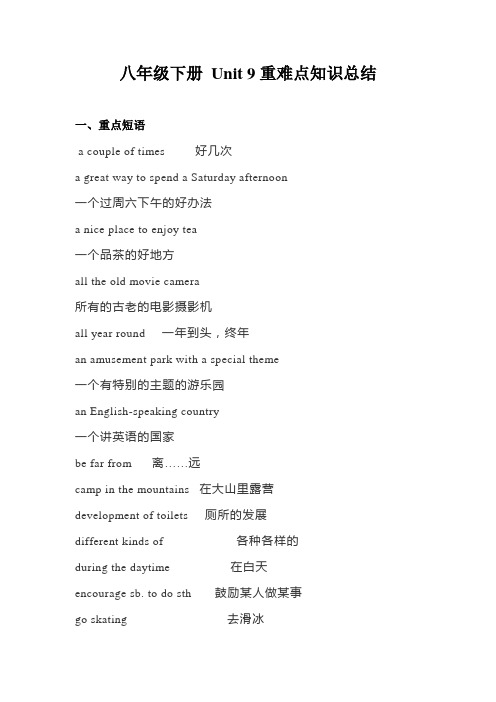
八年级下册Unit 9重难点知识总结一、重点短语a couple of times 好几次a great way to spend a Saturday afternoon一个过周六下午的好办法a nice place to enjoy tea一个品茶的好地方all the old movie camera所有的古老的电影摄影机all year round 一年到头,终年an amusement park with a special theme一个有特别的主题的游乐园an English-speaking country一个讲英语的国家be far from 离……远camp in the mountains 在大山里露营development of toilets 厕所的发展different kinds of 各种各样的during the daytime 在白天encourage sb. to do sth 鼓励某人做某事go skating 去滑冰go somewhere different 去不同的地方have a problem doing sth 做某事很困难have been to sp. 去过某地hear of 听说in a more natural environment在一个更加自然的环境中in such a rapid way以如此速猛的方式in the dark 在黑暗中in the past 在过去learn about sth 了解有关,的情况make a perfect cup of tea with beautiful tea sets 用漂亮的茶具沏一杯完美的茶on the one hand....on the other hand一方面,另一方面on the weekend 在周末put up a tent 搭帐篷right now 现在,目前science museum 科学博物馆social groups 社会团体southeast Asia 东南亚take a ride 兜风take the subway 坐地铁the tea art performances茶艺表演the Terracotta Army 兵马俑Thousands of 数以千计的three quarters 四分之三Walk around the park在公园里到处走二、词法精选1.encourage 鼓励及物动词,意为“鼓励”,encourage sb.to do sth. 鼓励某人做某事,encourage sb.in sth.在某方面鼓励某人。
新目标英语八年级下Unit9知识点总结(打印版)

U9重点短语1.the film /space / history/ art / museum电影/太空/历史/艺术博物馆2.water/ amusement park水上公园/游乐场3.take the subway乘地铁----by subway4.have a great time过得愉快=enjoy oneself= havefun +doing s th5.go skating/ boating/ shopping/ swimming/fishing/kiting/hunting/hiking去滑冰/划船/购物/游泳/钓鱼/放风筝/打猎/远足6.all the old movie cameras所有古老的电影摄影机7.a great way to spend a Saturday afternoon=a greatway of spending…8.put up a tent搭帐篷(put ---put----put)put up 张贴;举起put up a picture on the wall ;put up your hand9.try it = have a try it=want a try it试一试它10.i n such a rapid way 以如此迅猛的方式11.a very unusua l museum一个不寻常的博物馆anunusual way12.t he International Museum of Toilets国际马桶博物馆13.s o many different kinds of toilets 那么许多不同种类的厕所14.t each people about the history and development oftoilets告诉人们厕所的历史和发展(develop—development---developing---develope d)15.e ncourage sb to do sth鼓励某人做某事=sb beencouraged to do sth16.t he Hangzhou National Tea Museum杭州国家茶博物馆17.a relaxing and peaceful place一个令人放松并且宁静的地方18.t ea art performances(perform)茶艺表演19.m ake a perfect cup of tea沏一杯完美的茶20.t ea sets茶具21.a couple of times两次22.b e happy to do sth 高兴地干某事23.a boat ride乘船(名词短语)24.t ake a ride on the boat乘船(动词短语)25.i n Southeast Asia在东南亚26.t housands of …许多…,成千上万的…27.t ake a holiday度假28.o n the one hand…, on the other hand….一方面…,另一方面…29.a n English-speaking country 一个说英语的国家30.a ll year round全年31.d uring the daytime在白天at night 在夜晚32.b e close to…与…关系很亲密,离…很近33.o ne way that you’ve used一个你曾用过的方法34.o ne invention that you have found一个你曾发现的发明35.o ne thing that you have had一件你曾拥有过的东西36.c amp in the mountains在山中野营37.a nice place to enjoy tea 一个品茶的好地方38.t he Terracotta Army 兵马俑39.N ight Safari 夜间动物园40.t hree quarters 四分之三=three fourths41.r ight now 现在;目前42.h ave problems (in) doing sth =have trouble (in)doing43.做某事方面有困难44.a n amusement park with a special theme一个有特别的主题的游乐园45.w alk around the park 在公园里到处走46.h ear of 听说=hear about ;hear from sb 收到某人的来信hear sb do / doing sth 听见某人干过或正在干某事47.a nother province另一个省48.t he Bird’s Nest鸟巢49.s ocial groups 社会团体50.g o somewhere different 去不同的地方somewhere warm51.i n the past 在过去52.b e far from 离……远53.i n the dark 在黑暗中必背句子1.Have you ever been to a science museum? 你曾经去过科学博物馆吗?No, I’ve never been to a science museum.不,我从没有去过科学博物馆。
新目标英语八年级(下)Unit 9知识要点归纳

美知新目标英语八年级(下)Unit 9知识要点归纳1.It ’s unbelievable that technology has progressed in such a rapid way!令人难以置信的是科技以如此快的速度发展!2.I wonder how much more computer will be able to do in the future!我真不知道未来电脑还能做多少事情!3.Whether you like Indian food,Western food or Japanese food,you ’ll find it all in Singapore!无论你喜欢印度食物、西方食物还是日本食物,你都可以在新加坡找到。
4.It might seem strange to go to a zoo when it ’s dark.在天黑的时候去参观动物园似乎很奇怪。
5.Watching them prepare the tea with the beautiful tea sets is just as enjoyable as drinking tea itself.观看她们用精美的茶具沏茶就如同自己在品茶一般愉悦。
6.One great thing about Singapore is that the temperature is almost the same all year round.新加坡一个很大的特点就是它的气温一年到头几乎都是恒定的。
1.all year round 一年到头;终年3.natural environment 自然的环境5.be far from 离……远;远远不,非但不7.in the dark 在黑暗中9.in the past 在过去11.have been to someplace 去过某地13.learn about sth.了解有关……的情况15.put up a tent 搭帐篷17.in such a rapid way 以如此迅猛的方式19.different kinds of 各种各样的21.development of toilets 厕所的发展23.social groups 社会团体2.the tea art performances 茶艺表演4.tea sets 茶具6.thousands of 数以千计的8.three quarters 四分之三10.have problems doing sth.做某事有困难12.a couple of times 两三次14.right now 现在;目前16.hear of 听说18.take a ride 兜风20.make notes 做笔记22.write down 写下24.encourage sb.to do sth.鼓励某人做某事【重点词组或短语】【重难点句子】33。
unit9八年级下册知识点

unit9八年级下册知识点作为八年级下册的一名学生,我们需要掌握许多的知识点,其中最重要的就是Unit 9的知识点。
这个单元主要包括了英语的语法、词汇以及阅读。
下面我将分别为大家详细介绍这些知识点,帮助大家更好的掌握课堂学习内容。
语法篇在英语语法方面,这个单元主要包括了四个部分,分别是:一、一般将来时态一般将来时态是指某件事情将要发生或者会发生的时态,它的构成方式非常简单,只需要将“will/shall”和动词原形搭配使用即可。
例如:I will go to the beach tomorrow.(我明天会去海边。
)二、祈使句祈使句通常用来表达请求、命令、建议等含义,其语气比较强烈,常用于口语交流中。
一般来说,它的构成方式也比较简单,只需要将动词原形单独使用即可。
例如:Please clean your room.(请把你的房间打扫一下。
)三、宾语从句宾语从句是指在一个句子当中,充当宾语的从句。
通常使用“that”或者“whether/if”引导宾语从句。
例如:I know that you are busy.(我知道你很忙。
)四、被动语态被动语态是指将主动语态转换为被动语态,强调的是动作的接受者。
被动语态的构成方式为:be + 过去分词。
例如:The book was written by Mark Twain.(这本书是由马克·吐温写的。
)词汇篇在词汇方面,本单元主要涉及了一些与科技相关的单词和短语,如:1. download ——下载2. search ——搜索3. social media ——社交媒体4. web page ——网页5. click on ——点击6. upload ——上传7. search engine ——搜索引擎8. computer virus ——计算机病毒通过掌握以上单词和短语,可以更好地理解英语中与科技相关的内容,并且在撰写作文时,可以更准确的表达自己的意思。
八下unit9知识点汇总

目
CONTENCT
录
• 引言 • 词汇与短语 • 语法与句型 • 阅读与写作 • 听力与口语 • 知识点综合运用
01
引言
目的和背景
帮助学生系统复习和掌握八下Unit9的知识点,为期 末考试和升学考试做好准备。
提高学生的英语综合运用能力,包括听、说、读、 写四个方面。
培养学生的跨文化意识和国际视野,使其更好地适 应未来社会的发展需求。
用现在完成时表达某人对某地的了解或熟悉程度,例如
He has lived in Beijing for ten years, so he knows the city very well. 他已经在北京住了十年 ,所以他非常了解这个城市。
用现在完成时询问他人的经历或经验,例如
Have you ever tried Chinese food? 你尝过中国菜吗?
分析文章结构
通过阅读全文,了解文章的中心思想和主 题。
分析文章的段落和层次,理解作者的观点 和态度。
推断生词词义
理解细节信息
根据上下文语境和构词法,推断生词的词 义。
仔细阅读文章,理解文章中的细节信息, 如时间、地点、人物等。
写作实践
审题立意
认真审题,明确写作要求和主题,确定文章 的中心思想。
列提纲
《我的家乡》
介绍作者的家乡,包括地理位置、自然风光、人 文景观和特色美食等。
《一次难忘的比赛》
描述作者参加的一次比赛,包括比赛过程、自身 表现和获得的经验教训等。
05
听力与口语
听力技巧
预测
在听录音材料前,快速浏 览题目和选项,预测可能
涉及的主题和内容。
速记
unit9 八年级下知识点

unit9 八年级下知识点Unit 9 八年级下知识点在八年级下学期的学习中,Unit 9 是一个重要的章节。
本文将介绍Unit 9 中的知识点,帮助学生更好的理解和掌握其中的内容。
一、动词时态在 Unit 9 中,我们需要掌握常用的动词时态。
除了基本的一般现在时、一般过去时、一般将来时,我们还需要了解现在完成时、过去完成时和将来完成时。
这些时态用于不同的情况,例如现在完成时表示与现在有关的过去事情,过去完成时表示过去某一时刻或另一个过去事件之前的动作,将来完成时表示未来某一时刻之前完成的动作。
二、形容词比较级和最高级在 Unit 9 中,我们需要掌握形容词比较级和最高级的用法。
比较级用于比较两个人或物的差异,最高级则用于表示三个或以上人或物之间的差异。
我们需要学习规则变化以及不规则变化形容词的比较级和最高级。
三、虚拟语气虚拟语气是在不真实的条件下用于表示推测、愿望、建议、假设等情况的语气。
在 Unit 9 中,我们需要掌握 if 引导的虚拟条件句和 should 引导的虚拟语气从句的用法。
例如,If I had time, I would go hiking this weekend. (如果我有时间,我会在这个周末去远足。
), I suggest that he should take a break. (我建议他休息一下。
)四、副词在 Unit 9 中,我们需要学习副词的用法。
副词可以用于修饰动词、形容词、其他副词和整个句子。
我们需要掌握常用的副词,例如 well, badly, slowly, fast 等。
此外,我们还需要注意副词的比较级和最高级形式的用法。
五、情态动词情态动词是用于表示说话人的情感、意愿、态度等的动词。
在Unit 9 中,我们需要学习常用的情态动词,例如 can, could, may, might, must 等。
它们可以用于表达能力、请求、建议、猜测等情况。
以上是 Unit 9 八年级下知识点的内容总结。
新版新目标英语八年级下册unit9知识点总结

Unit 9 Have you ever been to a museum一、要点与短:1. space museum太空博物2. amusement park公园3. water park水上公园4. take the subway乘地5. last year昨年6. next year明年7. have a great time玩得快乐8. end up束9. a theme park主公园10. of course自然11. all the time向来12. many famous characters多着名的人物13. hear of听14. in the same place在同一个地方15 most of⋯大部分的 ...16.. in fact事上17. an English-speaking country 一个英的国家18. a tour guide一名游19help sb. (to) do帮助某人做某事20. start doing sth.开始做某事to do sth.开始做某事22. take a holiday 度假23.. on the one hand,⋯ on the other hand一方面,⋯另一方面⋯24.. three quarters四分之三25. wake up醒来26. all the year round一年到,年二、要点短精曾(用于在达成。
ever 用于疑句、否认句 )Have you ever seen the filmNo, never.has been to / have / has gone to / have/ has been in 辨析:(1)have/ has been to + 地名曾去某地, 在已回到原地。
He has been to England twice.(在已不在英国了 )Have you ever been to the Great Wall (在已不在城上)(2)have gone to 已去某地了,人不在。
八下英语unit9知识点总结
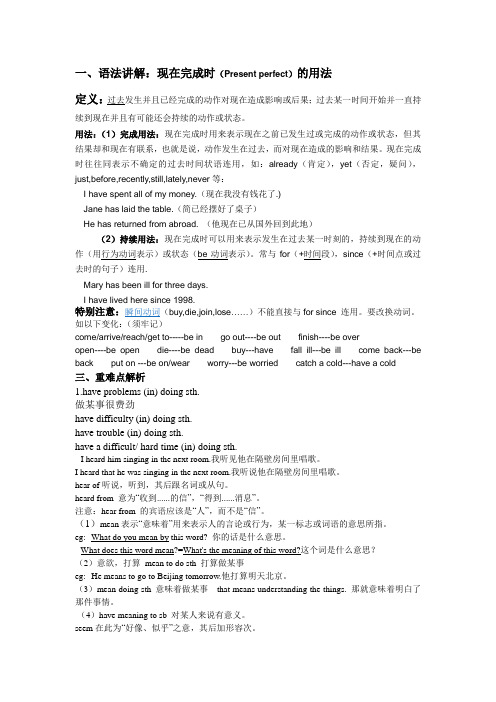
一、语法讲解:现在完成时(Present perfect)的用法续到现在并且有可能还会持续的动作或状态。
用法:(1)完成用法:现在完成时用来表示现在之前已发生过或完成的动作或状态,但其结果却和现在有联系,也就是说,动作发生在过去,而对现在造成的影响和结果。
现在完成时往往同表示不确定的过去时间状语连用,如:already(肯定),yet(否定,疑问),just,before,recently,still,lately,never等:I have spent all of my money.(现在我没有钱花了.)Jane has laid the table.(简已经摆好了桌子)He has returned from abroad. (他现在已从国外回到此地)(2)持续用法:现在完成时可以用来表示发生在过去某一时刻的,持续到现在的动作(用行为动词表示)或状态(be动词表示)。
常与for(+时间段),since(+时间点或过去时的句子)连用.Mary has been ill for three days.I have lived here since 1998.特别注意:瞬间动词(buy,die,join,lose……)不能直接与for since 连用。
要改换动词。
如以下变化:(须牢记)come/arrive/reach/get to-----be in go out----be out finish----be overopen----be open die----be dead buy---have fall ill---be ill come back---be back put on ---be on/wear worry---be worried catch a cold---have a cold三、重难点解析1.have problems (in) doing sth.做某事很费劲have difficulty (in) doing sth.have trouble (in) doing sth.have a difficult/ hard time (in) doing sth.--I heard him singing in the next room.我听见他在隔壁房间里唱歌。
八下unit9单元知识点总结

知识点Unit 9 Have you ever been to a museum?Section A部分知识点1. Have you ever been to a science museum? 你曾经去过科学博物馆吗?1)have been to sp.去过某地2)ever 意为“曾经”,用于疑问句或否定句中,放在助动词与过去分词之间。
e.g. Have you ever been to Hong Kong? 你曾去过香港吗?I haven’t ever spoken to her. 我未曾和她说过话。
3)never意为“从来没有”常与before连用,多放在助动词与过去分词之间。
e.g. I have never travelled by plane before. 我以前从来没有乘飞机旅行过。
2. 比较:1) He has been to Beijing. 他曾去过北京。
(人已回来,可能在这儿)have / has been (to) “曾经到过某地”,说话时此人不在那里,已经回来。
侧重指经历。
2) He has gone to Beijing. 他已经去北京了。
(人已走,不在这儿)have / has gone (to)某人“已经去某地了”,说话时此人可能在路上或已到那里,不在这里。
3. Me neither.我也没/ 不…。
Me too.我也一样/我也如此。
4. I went there back in April. 我在四月份去的那里。
5. It’s interesting, isn’t it?反义疑问句6. The invention led to color movies.成就了彩色电影。
lead to7. put up a tent搭帐篷8. I’ve never been camping. 我从未野营过。
“现在完成进行时”结构为“have been + 现在分词”,表示从过去某一时刻延续至今的动作。
- 1、下载文档前请自行甄别文档内容的完整性,平台不提供额外的编辑、内容补充、找答案等附加服务。
- 2、"仅部分预览"的文档,不可在线预览部分如存在完整性等问题,可反馈申请退款(可完整预览的文档不适用该条件!)。
- 3、如文档侵犯您的权益,请联系客服反馈,我们会尽快为您处理(人工客服工作时间:9:00-18:30)。
新版新目标八年级下uni9Have you ever been to a museum?(谈论过去的经历、学习现在完成时态的已完成性)知识点总结第 1 页 共 1 页重点短语1. the film /space / history/ art / museum 电影/太空/历史/艺术博物馆2. water/ amusement park 水上公园/游乐场3. take the subway 乘地铁----by subway4. have a great time 过得愉快=enjoy oneself= have fun +doing s th5. go skating/ boating/ shopping/ swimming/ fishing/kiting/hunting/hiking 去滑冰/划船/购物/游泳/钓鱼/放风筝/打猎/远足6. all the old movie cameras 所有古老的电影摄影机7. a great way to spend a Saturday afternoon=a great way of spending … 8. put up a tent 搭帐篷 (put ---put----put )put up 张贴;举起 put up a picture on the wall ; put up your hand 9. try it = have a try it=want a try it 试一试它 10. i n such a rapid way 以如此迅猛的方式 11. a very unusua l museum 一个不寻常的博物馆 an unusual way 12. t he International Museum of Toilets 国际马桶博物馆 13. s o many different kinds of toilets 那么许多不同种类的厕所 14. t each people about the history and development of toilets 告诉人们厕所的历史和发展 (develop —development---developing---developed ) 15. e ncourage sb to do sth 鼓励某人做某事=sb be encouraged to do sth 16. t he Hangzhou National Tea Museum 杭州国家茶博物馆 17. a relaxing and peaceful place 一个令人放松并且宁静的地方 18. t ea art performances (perform)茶艺表演 19. m ake a perfect cup of tea 沏一杯完美的茶 20. t ea sets 茶具 21. a couple of times 两次 22. b e happy to do sth 高兴地干某事 23. a boat ride 乘船(名词短语) 24. t ake a ride on the boat 乘船(动词短语) 25. i n Southeast Asia 在东南亚 26. t housands of …许多…,成千上万的… 27. t ake a holiday 度假 28. o n the one hand…, on the other hand….一方面…, 另一方面… 29. a n English-speaking country 一个说英语的国家 30. a ll year round 全年 31. d uring the daytime 在白天 at night 在夜晚 32. b e close to…与…关系很亲密,离…很近 33. o ne way that you’ve used 一个你曾用过的方法 34. o ne invention that you have found 一个你曾发现的发明 35. o ne thing that you have had 一件你曾拥有过的东西 36. c amp in the mountains 在山中野营 37. a nice place to enjoy tea 一个品茶的好地方 38. t he Terracotta Army 兵马俑 39. N ight Safari 夜间动物园 40. t hree quarters 四分之三=three fourths 41. r ight now 现在;目前 42. h ave problems (in) doing sth =have trouble (in) doing 43. 做某事方面有困难 44. a n amusement park with a special theme 一个有特别的主题的游乐园 45. w alk around the park 在公园里到处走 46. h ear of 听说 =hear about ;hear from sb 收到某人的来信 hear sb do / doing sth 听见某人干过或正在干某事 47. a nother province 另一个省 48. t he Bird’s Nest 鸟巢 49. s ocial groups 社会团体 50. g o somewhere different 去不同的地方somewhere warm51. i n the past 在过去52. b e far from 离……远 53. i n the dark 在黑暗中必背句子1. Have you ever been to a science museum? 你曾经去过科学博物馆吗?No, I’ve never been to a science museum.不,我从没有去过科学博物馆。
2. Have you ever visited the space museum?你曾经参观过太空博物馆吗?No, I’ve never been there.不,我从没去过那儿。
3.I learned about the inventions that led to color movies, too.了解;得知 (先行词) (定语从句)我也了解了促使彩色电影产生的那些发明lead –led to 通向;导致4.We put up a tent and cooked outside.(反意疑问句) didn ’t you?5.I ’ve never been camping.我从来没有野营过。
(现在完成进行时)―have /has been +doing ‖6.The most interesting museum I’ve ever been to is the American Computer(定语从句修饰的最高级先行词)(定语从句中的ever ,never 完成时) Museum.我曾经参观过的最有趣的博物馆是美国计算机博物馆。
7.It’s unbelievable that technology has progressed in such a rapid way!(it 形式主语) (主语从句)技术以如此迅速的方式进步真是令人难以置信。
make progress in… 在某方面取得进步8.I wonder how much more computers will be able to do in the future.(how much 引导的宾语从句,并作to do 的宾语)我想知道,未来计算机还能做多少工作呢。
wonder 为动词,意为“想知道”,后接if ,who ,what ,why 等引导的宾语从句或后接“疑问句+不定式”构成的短语。
I wonder who she is. 我想知道她是谁。
9.I just couldn’t believe my eyes when I saw so many different kinds of toilets there. (when 引导的时间状语从句)当我在那儿看到如此多不同种类的马桶时,我不能相信自己的眼睛。
10.It also encourage s governments and social groups to think about ways to improve toilets in the future.(作ways 的后置定语) 它也鼓励政府和社会团体思考未来改善厕所的方法。
11.The tea art performances show how to make a perfect cup of tea with (可数名词) (特殊疑问词+to do )作show 的宾语 beautiful tea sets.茶艺表演展示了如何用精美的茶具冲泡一杯完美的茶。
Practice makes perfect.熟能生巧12.You can also see the Disney characters walkin g around the park.你还可以看到迪尼斯卡通人物在公园里走来走去。
13.Watching the tea preparation is just as enjoyable as drinking the tea itself.(动名词短语作主语,谓语要用单数)(as +原级+as ) 观看泡茶过程与喝茶本身一样让人愉快。
14.I’ve finally realized why my grandpa loves drinking tea and collecting tea sets. (why 引导的宾语从句)我已最终意识到了为什么我的爷爷热爱喝茶和收藏茶具了。
15.In Singapore, however, you’ll find a lot of food from China; you won’t have any problem getting rice, boodles or dumplings.然而,在新加坡,你会发现许多中国食物;在那里,吃米饭,面条和饺子一点都不成问题。
16.Singapore is also an excellent place to try new food.新加坡也是一个尝试新食物的好地方 (动词不定式作后置定语)17.Whether you like Indian food , Western food or Japanese food, you’ll find (whether 引导让步状语从句,主将从现)it all in Singapore!无论你喜欢印度食品,西方食品还是日本食品,在新加坡,你都会找到。
